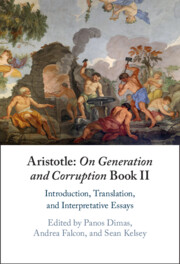 Aristotle: On Generation and Corruption Book II
Aristotle: On Generation and Corruption Book II Book contents
- Aristotle: On Generation and Corruption Book II
- Aristotle: On Generation and Corruption Book II
- Copyright page
- Contents
- Figures
- Tables
- Notes on Contributors
- Preface
- Abbreviations
- Part I Introduction and Interpretative Essays
- 1 On Generation and Corruption II
- 2 On Generation and Corruption II 1
- 3 On Generation and Corruption II 2
- 4 On Generation and Corruption II 3
- 5 On Generation and Corruption II 4
- 6 On Generation and Corruption II 5
- 7 On Generation and Corruption II 6
- 8 On Generation and Corruption II 7
- 9 On Generation and Corruption II 8
- 10 On Generation and Corruption II 9
- 11 On Generation and Corruption II 10
- 12 On Generation and Corruption II 11
- Part II Translation
- References
- Subject Index
- Index of Passages
12 - On Generation and Corruption II 11
from Part I - Introduction and Interpretative Essays
Published online by Cambridge University Press: 10 November 2022
- Aristotle: On Generation and Corruption Book II
- Aristotle: On Generation and Corruption Book II
- Copyright page
- Contents
- Figures
- Tables
- Notes on Contributors
- Preface
- Abbreviations
- Part I Introduction and Interpretative Essays
- 1 On Generation and Corruption II
- 2 On Generation and Corruption II 1
- 3 On Generation and Corruption II 2
- 4 On Generation and Corruption II 3
- 5 On Generation and Corruption II 4
- 6 On Generation and Corruption II 5
- 7 On Generation and Corruption II 6
- 8 On Generation and Corruption II 7
- 9 On Generation and Corruption II 8
- 10 On Generation and Corruption II 9
- 11 On Generation and Corruption II 10
- 12 On Generation and Corruption II 11
- Part II Translation
- References
- Subject Index
- Index of Passages
Summary
This essay provides basic exposition of GC II 11; for though the upshot of this difficult chapter is by and large clear, the argumentative details are often hard to make out. The question of the chapter is whether there is anything that comes to be of necessity; its answer, briefly put, is that there would be if there were anything whose coming to be was everlasting, which there would be if there were anything whose coming to be was cyclical, which in point of fact there is (e.g., solstices). The argument fails, of course; the reason, I suggest, is that it does not follow, from the fact that (say) solstices come to be cyclically, that they are always in process of coming to be.
- Type
- Chapter
- Information
- Aristotle: On Generation and Corruption Book IIIntroduction, Translation, and Interpretative Essays, pp. 243 - 258Publisher: Cambridge University PressPrint publication year: 2022
